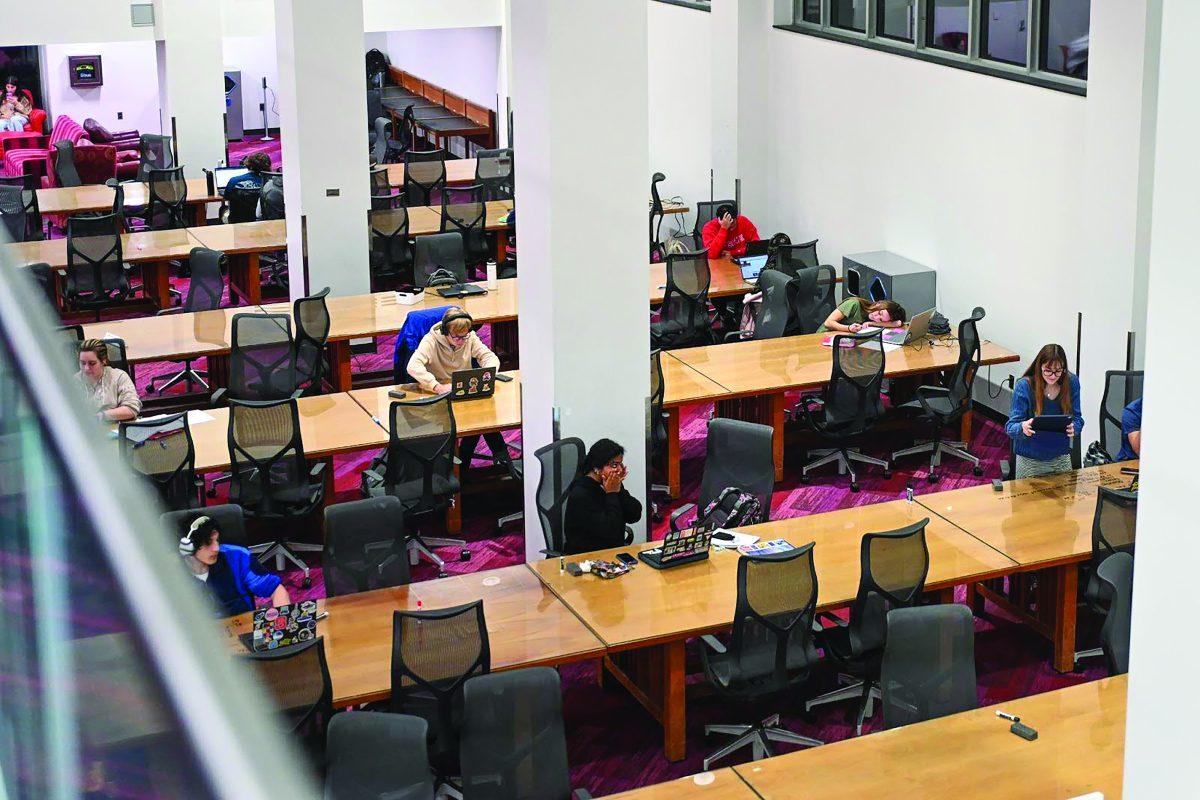 Students study in D.H. Hill Library on Thursday, Nov. 21, 2024. The NC State Special Collections Research Center houses archived materials within the library." />
Students study in D.H. Hill Library on Thursday, Nov. 21, 2024. The NC State Special Collections Research Center houses archived materials within the library." />
Kaela Belingon
Students study in D.H. Hill Library on Thursday, Nov. 21, 2024. The NC State Special Collections Research Center houses archived materials within the library.
Author Hannah Moushabeck was initially barred from reading her award-winning children’s book at a campus event due to the UNC System’s Equality Policy mandating institutional neutrality. However, Moushabeck later read it to an audience despite the policy’s prohibitions, prompting discussions on how these policies will be interpreted on campus.
Moushabeck, a Palestinian American author and publisher, was invited by NC State Libraries to participate in events, including an Oct. 18 “Storytime with Hannah Moushabeck and Habibti Bookshop” where she planned to read her picture book “Homeland: My Father Dreams of Palestine.” However, she said she was informed on Oct. 7 by event organizers that university administration prohibited her from reading the book, citing the UNC System’s Equality Policy that requires university departments to remain neutral on political and social issues when representing the university.
Moushabeck said the book was banned because it allegedly did not present “two sides” of the story — a reason that Moushabeck finds misguided since the book is a memoir picture book recounting her family’s lived experience.
“They said that my book violated that policy, which I obviously had a million more questions that I didn’t really get answers for,” Moushabeck said. “I wasn’t told what specific parts of my book violated the policy.”
The book, published by Chronicle Books in March 2023, follows three young girls learning about their dad’s homeland, Palestine, and aims to make Palestinians feel seen and proud while also serving as a cultural window for non-Arab readers. Moushabeck highlighted the emotional connection the book has garnered for her and others, sharing a story of an elderly man from Jerusalem who was moved by the book because it showed him his homeland, streets he hadn’t seen in a half-century, which he had been forced to leave due to Nakba, a period of genocide and displacement of Palestinians by Israel in 1948. She said the man’s daughter reached out to her recently to share that the man had passed away and requested the book be read at his funeral.
Moushabeck spoke about how the negative feedback and censorship toward her book have impacted her.
“It doesn’t feel like, oh, they just didn’t like my book. It feels like a rejection of my personhood,” Moushabeck said. “And that has been super emotional. I also feel deeply defensive because it is my family. It’s not like people are criticizing characters that I made up. They’re criticizing my literal father and sisters and aunts and uncles.”
Despite initially being blocked, Moushabeck eventually read from her book on campus, with the help of Habibti Bookshop, a mobile bookstore that uplifts historically marginalized authors. In an Instagram reel, Moushabeck said she was supported by campus attendees and advocates.
In an email statement to Technician, NC State Libraries Director of Communications Chris Tonelli explained the decision as an adherence to state law and UNC System policies requiring university-sponsored events to avoid appearing as if the university is taking a political stance. The UNC System policy states, “No employing subdivision or employment position within the University shall be organized, be operated, speak on behalf of the University… regarding matters of contemporary political debate or social action.”
“The Libraries made the determination to change the previously scheduled engagement on Saturday to a general celebration of reading and not feature a specific author or authors,” Tonelli wrote.
The event’s original title was changed, but the link still referenced the storytime, Moushabeck said.
In response to the incident, NC State Student Government introduced the “Moushabeck Freedom to Read Act,” a resolution condemning the restriction of Moushabeck’s reading and affirming freedom of expression and cultural representation on campus. Sponsored by Senator Kaleb Garcia and others, the resolution calls for clear guidelines that protect invited speakers, especially those from marginalized backgrounds, and requests university leadership to clarify how the institutional neutrality policy is applied.
Garcia, a first-year studying communication and political science and the resolution’s corresponding sponsor, said the bill aims to emphasize a commitment to valuing all voices and identities at NC State.
“It is our job to essentially advocate for [students],” Garcia said. “And when we have Palestinian students here at NC State and we need to ensure that they know that we value their voices, we value their stories, we value them here at NC State. Even to go as far as our mission, our vision and our values here at NC State, you know, they go as far to basically say, we value you being here.”
The controversy comes amid broader national debates over book banning, particularly involving works by and about marginalized communities, sparking concern about censorship on college campuses and the preservation of academic freedom.
Moushabeck, who co-runs Interlink Publishing, the only Palestinian-owned press in the U.S., mentioned the rarity of Palestinian children’s literature in American publishing, saying before her book was published, there had not been a Palestinian picture book in over 30 years. Speaking about her book, she highlighted the importance of authenticity in storytelling, given widespread misrepresentations of Palestinian experiences.
“I felt like for the first Palestinian-American picture book in 30 years, it was so important that we represented the truth as accurately as possible,” Moushabeck said.
NC State Libraries currently has “Homeland: My Father Dreams of Palestine” available for checkout as part of its collection.